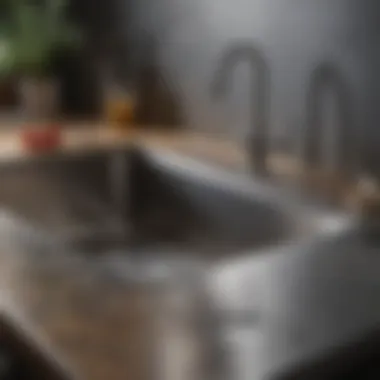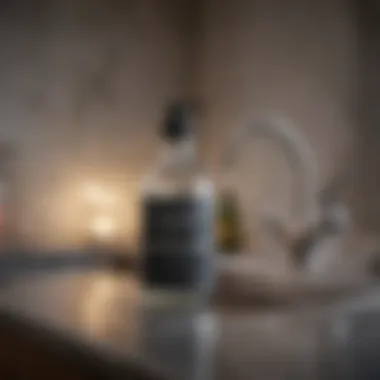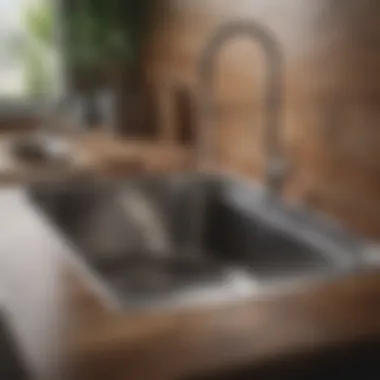Eco-Friendly Guide: Create Your Own Stainless Steel Sink Cleaner


Stainless steel sinks are a popular choice for many households due to their sleek appearance and durability. However, maintaining their shine and cleanliness can be a challenge. The art of creating a homemade cleaner tailored for stainless steel sinks allows homeowners to achieve a cost-effective and eco-friendly solution using simple household ingredients. This comprehensive guide will take you through the steps of preparing a DIY cleaner that will help keep your stainless steel sink sparkling like new.
Key Ingredients and their Benefits
Before delving into the actual cleaning process, it's essential to understand the key ingredients that will be used to make the homemade cleaner. Vinegar, known for its powerful cleaning properties, will act as the primary agent in cutting through grease and grime on the stainless steel surface. Baking soda, a mild abrasive, will aid in scrubbing away tough stains without scratching the sink. Additionally, lemon juice will not only impart a fresh scent but also help in removing any lingering odors.
Step-by-Step Guide to Creating the Cleaner
- Start by mixing equal parts of vinegar and water in a spray bottle. The diluted vinegar solution will serve as the base of your cleaner, ensuring it is not too harsh on the stainless steel.
- Sprinkle a generous amount of baking soda directly onto the surface of the sink. Allow it to sit for a few minutes to loosen any stubborn debris.
- Use a soft sponge or cloth to scrub the sink gently, focusing on areas with visible stains or discoloration. The mild abrasive nature of the baking soda will help lift dirt without causing damage.
- Squeeze fresh lemon juice over the sink, spreading it evenly to cover the entire surface. The acidity of the lemon will further break down grease and leave behind a pleasant citrus scent.
- Wipe down the sink with a damp cloth to remove any residue and reveal a clean and shiny finish. Repeat the process as needed to maintain the sparkle of your stainless steel sink.
Conclusion
By following this DIY cleaner recipe, homeowners can ensure their stainless steel sinks remain spotless and gleaming without relying on harsh chemicals. The use of everyday household items not only makes this cleaner cost-effective but also environmentally friendly. Say goodbye to dull and dirty sinks with this simple yet effective homemade solution.
Introduction
Homemade cleaners have gained prominence in modern households, not only due to their cost-effectiveness but also their environmental impact. When it comes to maintaining stainless steel sinks, a dedicated homemade cleaner can work wonders. This article ventures into the realm of crafting a specialized cleaner to uphold the cleanliness and luster of your stainless steel sink. By utilizing simple ingredients found in every kitchen, you can ensure a sparkling sink without harsh chemicals or excessive costs. The significance of this topic lies in promoting sustainable cleaning practices without compromising on efficiency. As homeowners increasingly seek greener alternatives, understanding how to make a homemade cleaner for stainless steel sinks becomes pivotal in fostering eco-conscious habits within domestic spaces.
Understanding Stainless Steel Sinks
Stainless steel sinks are a ubiquitous feature in modern kitchens. Their sleek and timeless appearance makes them a popular choice for homeowners looking to add a touch of sophistication to their culinary space. Understanding the nuances of stainless steel sinks is crucial for their proper maintenance and longevity. This section will delve into the properties of stainless steel that make it an ideal material for sinks and highlight the importance of using the right cleaning methods to preserve its luster.
Properties of Stainless Steel
Durability
The hallmark characteristic of stainless steel sinks is their exceptional durability. Stainless steel is known for its strength and resilience, making it resistant to denting, scratching, and staining. This durability ensures that your sink can withstand the rigors of daily use without losing its shine. The ability of stainless steel to maintain its structural integrity over time is a key factor in its popularity for kitchen fixtures like sinks. While durable, stainless steel sinks are not entirely immune to wear and tear, requiring proper care to prolong their lifespan.


Resistance to Corrosion
Another significant advantage of stainless steel sinks is their remarkable resistance to corrosion. Stainless steel contains chromium, which forms a protective oxide layer on the surface when exposed to oxygen. This oxide layer acts as a shield against rust and corrosion, ensuring that your sink remains free from unsightly blemishes. The resistance to corrosion makes stainless steel sinks a hygienic choice for kitchens, as it inhibits the growth of bacteria and minimizes the risk of contamination. However, despite its corrosion-resistant properties, stainless steel sinks can still show water spots and fingerprints over time, necessitating regular cleaning to maintain their aesthetic appeal.
Importance of Proper Cleaning
Proper cleaning practices are essential for preserving the appearance and functionality of stainless steel sinks. Regular cleaning helps prevent the buildup of grime, grease, and mineral deposits that can dull the sink's finish and harbor germs. By using the right cleaning techniques and solutions, you can effectively remove stains, sanitize the surface, and restore the luster of your stainless steel sink. Neglecting proper cleaning may lead to tarnishing, pitting, or scratching of the sink, compromising its visual appeal and hygiene. To ensure your stainless steel sink maintains its brilliance and durability, it is imperative to follow a consistent cleaning routine tailored to its specific requirements.
Benefits of Homemade Cleaners
Homemade cleaners offer a multitude of benefits that elevate them above their commercial counterparts. First and foremost, the primary advantage lies in their eco-friendly nature. By using natural ingredients such as white vinegar, baking soda, and lemon juice, you can clean your stainless steel sink without introducing harmful chemicals into your living space. This eco-conscious approach aligns with the growing trend of sustainable living, making homemade cleaners an attractive choice for environmentally-conscious individuals.
Additionally, homemade cleaners are cost-effective. Unlike store-bought cleaners that can be expensive, creating your own cleaning solution requires minimal investment. The ingredients needed are often readily available in your kitchen, eliminating the need for recurrent purchases of specialized cleaning products. This cost-friendly aspect makes homemade cleaners a budget-friendly alternative that doesn't compromise on cleaning efficacy.
Furthermore, homemade cleaners can be customized to suit your preferences and needs. With a basic understanding of ingredient properties, you can tailor your cleaner to target specific cleaning challenges. For instance, if your stainless steel sink requires extra scrubbing power, you can adjust the proportions of baking soda or vinegar in your cleaning solution. This versatility allows you to address varying levels of dirt and grime effectively, ensuring a sparkling clean sink after each use.
Essential Ingredients for Homemade Cleaner
In the realm of crafting homemade cleaners for stainless steel sinks, the backbone lies in selecting the right ingredients. Your cleaner's effectiveness and eco-friendliness depend significantly on the components you choose to incorporate. Focusing on natural elements ensures that your sink is not only free from harsh chemicals but also maintains its shine over time. Understanding the role and benefits of each essential ingredient is crucial for achieving desired results.
White Vinegar
White vinegar stands out as a powerhouse component in homemade stainless steel sink cleaners. Its acidic nature helps in breaking down grime and mineral deposits, leaving your sink sparkling clean. Moreover, white vinegar is a natural disinfectant, making it ideal for maintaining a hygienic environment in your kitchen. When mixed with water, it creates a potent cleaning solution that effectively removes stains and odors without damaging the stainless steel surface.
Baking Soda
Another vital ingredient in DIY stainless steel sink cleaners is baking soda. This versatile powder acts as a gentle abrasive, helping to scrub away tough stains and grease buildup without scratching the sink's surface. When combined with other ingredients like white vinegar or water, baking soda forms a powerful paste that can tackle even the most stubborn residue. Its deodorizing properties also help in neutralizing any unwanted odors, leaving your sink fresh and clean.


Lemon Juice
Lemon juice plays a dual role in homemade stainless steel sink cleaners. Apart from adding a pleasant citrus scent to your cleaning solution, it also acts as a natural bleaching agent, making it effective in lightening stains and brightening the sink's surface. The acidity of lemon juice helps in cutting through grease and grime, while its antiseptic properties contribute to overall cleanliness. Incorporating lemon juice into your DIY cleaner not only enhances its cleaning power but also leaves behind a refreshing aroma, elevating the overall cleaning experience.
DIY Recipes for Homemade Cleaner
In the realm of stainless steel sink maintenance, the DIY approach holds a special place. DIY recipes for homemade cleaners offer a unique blend of cost-effectiveness, environmental friendliness, and customized cleaning solutions. By diving into creating your own cleaning concoctions, you not only save on expenses but also gain the satisfaction of tailoring the cleaner to suit your preferences and needs perfectly.
Moreover, DIY recipes empower you to control the ingredients used, ensuring that no harmful chemicals come in contact with your sink or the environment. This aspect is particularly appealing for homeowners looking to maintain a healthy living space while minimizing their ecological footprint.
When delving into DIY recipes for homemade cleaner, one can explore various combinations and concentrations to find the ideal formula that achieves a sparkling clean stainless steel sink without compromising its integrity. The process becomes a creative endeavor where experimentation is key, allowing you to discover the most effective and efficient solution for your sink's unique cleaning requirements.
Vinegar and Water Solution
One of the staple DIY recipes for the savvy stainless steel sink cleaner is the vinegar and water solution. This simple yet powerful concoction combines the grease-cutting properties of vinegar with the cleansing action of water to create a potent cleaner that tackles grime and residue effectively.
To prepare this solution, mix equal parts of white vinegar and water in a spray bottle. The acidity of the vinegar helps break down stubborn stains and mineral deposits, while water dilutes the mixture to make it gentle enough for regular use on stainless steel surfaces.
When applying the vinegar and water solution to your sink, ensure even coverage and let it sit for a few minutes to allow the cleaning agents to work their magic. Then, scrub gently with a soft-bristled brush or sponge before rinsing thoroughly with water. This method not only cleans effectively but also imparts a mirror-like shine to your stainless steel sink, leaving it looking rejuvenated and spotless.
Baking Soda Paste
Another go-to DIY recipe for homemade over ByünKleaner is the baking soda paste. Known for its gentle abrasiveness and deodorizing properties, baking soda is a versatile ingredient that complements the cleaning action of vinegar perfectly.
To create a baking soda paste, mix baking soda with a small amount of water to achieve a spreadable consistency. This paste can be applied directly to tough stains and greasy buildup on your stainless steel sink, acting as a natural scrubbing agent that helps dislodge dirt and grime without damaging the metal surface.
Due to its non-abrasive nature, baking soda is safe to use on stainless steel, making it an excellent choice for regular sink maintenance. Its ability to neutralize odors and absorb excess moisture further enhances its cleaning prowess, leaving your sink not just clean but also fresh-smelling and dry.


Lemon Juice Spray
For those seeking a fragrant and efficient cleaning solution, the lemon juice spray is a delightful option. Lemon juice, with its natural antibacterial properties and refreshing citrus scent, adds a zesty twist to your DIY cleaning repertoire.
To prepare a lemon juice spray, mix fresh lemon juice with water in a spray bottle. The acidity of the lemon juice helps dissolve grease and grime while leaving behind a pleasant aroma that lingers subtly in your kitchen.
Spritz the lemon juice spray onto your stainless steel sink, paying extra attention to areas with tough stains or water spots. Allow the solution to sit for a few minutes before wiping it off with a damp cloth or sponge. The result is a gleaming sink that not only looks pristine but also carries a faint citrus fragrance, elevating your cleaning experience to a sensory delight.
Application and Cleaning Tips
Cleaning and maintaining stainless steel sinks not only keeps them visually appealing but also ensures their longevity. In this section, we will explore essential tips and techniques for effective application and cleaning.
Proper Technique for Application:
To begin, it's crucial to clean the sink with warm soapy water before applying any homemade cleaner. This helps in removing any surface debris or residue. Next, when applying the homemade cleaner, it's best to use a soft cloth or sponge to prevent scratching the stainless steel surface. Circular motions are recommended to ensure even distribution of the cleaner and reach all areas of the sink. While applying the cleaner, let it sit for a few minutes to break down any stains or grime effectively.
Maintenance Routine:
Establishing a regular maintenance routine is key to preserving the cleanliness and shine of stainless steel sinks. After each use, rinse the sink thoroughly to prevent the buildup of dirt and grime. A weekly cleaning routine using the homemade cleaner will help tackle any stubborn stains and maintain the sink's luster. Additionally, drying the sink with a soft cloth can prevent water spots and mineral deposits, enhancing its overall appearance.
Avoiding Abrasive Materials:
Avoiding abrasive materials is essential to prevent scratching or damaging the stainless steel sink. When cleaning, steer clear of harsh scrubbing pads, steel wool, or abrasive cleaners that can cause scratches or dullness. Opt for non-abrasive cleaning tools like microfiber cloths or soft sponges to protect the sink's finish. By avoiding abrasive materials, you can ensure your stainless steel sink remains pristine and scratch-free for years to come.
Conclusion
In the realm of homemaking, the closing segment of a how-to guide such as this carries paramount significance - the essence of tying together the learnings amassed and guiding the reader towards actionable outcomes. As we bid adieu to the discourse on creating homemade cleaners for stainless steel sinks, it is imperative to reflect on the essence encapsulated within. This article serves as a beacon of knowledge, illuminating the pathways towards holistic cleanliness and maintenance within the realm of household care.
The importance of the conclusion extends beyond mere closure; it serves as a roadmap, delineating the journey embarked upon to unearth the art of fabricating homemade sink cleaners. Capturing the essence of sustainable living and the fusion of eco-consciousness with practicality, this final segment reinforces the values of utilizing simple household ingredients for profound outcomes. The readers are urged to not only comprehend the recipes and techniques laid out but to internalize and implement them, transforming knowledge into tangible results in their domestic sanctuaries.
Furthermore, the conclusion encapsulates the core ethos of the entire narrative - the synergy between functionality and preservation. By diving into the nuances of concocting cleaners featuring white vinegar, baking soda, and lemon juice, the readers are equipped with the wisdom to maintain not just the cleanliness but also the longevity of their stainless steel sinks. The virtues of durability, resistance to corrosion, and cost-effectiveness interlace seamlessly within this conclusive discourse, underscoring the intrinsic worth of crafting one's cleaning solutions.
As we part ways with the riveting expedition through the realms of homemade cleaner concoctions, it is essential to carry forward the essence of empowerment and agency. The readers now possess a newfound arsenal of knowledge, poised to revolutionize their cleaning routines with a touch of innovation and sustainability. In essence, the culmination of this article marks not just the conclusion of a textual journey but the commencement of a practical odyssey towards enhanced cleanliness, environmental awareness, and domestic well-being.







